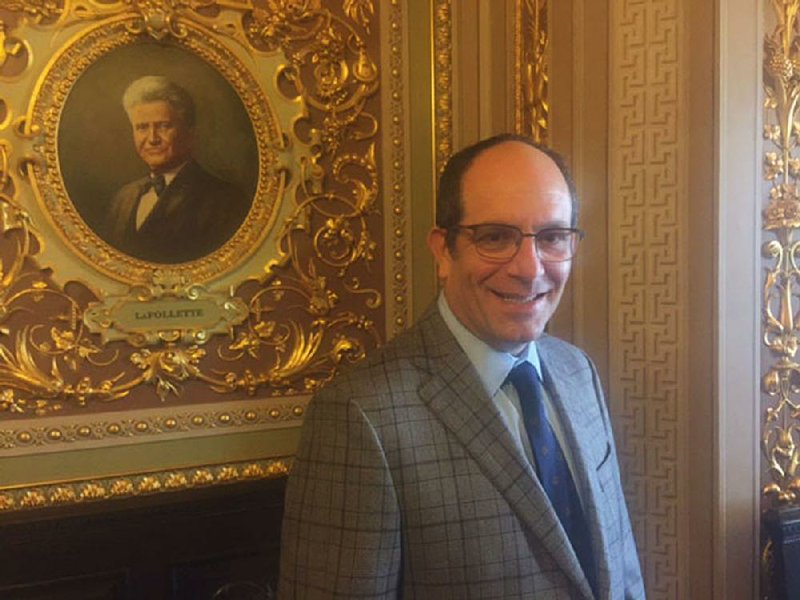WASHINGTON -- Four days after the White House suspended the U.S. Refugee Admissions Program, a Little Rock religious leader stood before the U.S. Senate on Tuesday and offered prayers for those who seek safe haven in this country.
RELATED ARTICLES
http://www.arkansas…">Trump picks Gorsuch for courthttp://www.arkansas…">Keeping job protections for gays, White House says
http://www.arkansas…">U.S.-entry bans get backing by Ryanhttp://www.arkansas…">No concerns about order by Trump, state AG says
Rabbi Barry Block of Congregation B'nai Israel asked that God would guide the lawmakers "to pursue liberty and justice, opportunity and equality for every man, woman and child within our borders, for those who would peacefully seek refuge on our shores, and for each of your children on earth."
Referring to the nation's 100 senators, Block said: "Make them ever mindful of your command, to remember the heart of the stranger -- the people most unlike them and the least powerful of voices -- for we were all strangers in one Egypt or another."
U.S. Sen. John Boozman, a Republican from Rogers, had arranged for Block to offer the noontime invocation.
[PRESIDENT TRUMP: Details on administration, previous coverage, photos, videos]
As the rabbi read the words of the prayer, Boozman, Sen. Tom Cotton, Senate Majority Leader Mitch McConnell and a few others silently bowed their heads and closed their eyes.
From the opening words to the final "Amen," the prayer lasted less than two minutes.
"It was awe-inspiring to be on the floor of the Senate, to stand at a place where some great men and women of our nation have stood before me," the rabbi said in an interview afterward.
His short invocation had been shaped, in part, by current events, he said.
"I am here today to offer a prayer, not a speech, but certainly I have in mind those refugees who seek freedom here in America and who may currently be held up," he said in an interview.
Block and a group of teenagers from his Reform Jewish synagogue were in Washington on Friday when President Donald Trump issued his executive order, temporarily barring entry to those from seven predominantly Muslim nations.
The presidential directive also suspended the U.S. State Department's refugee program for 120 days, while blocking Syrian refugees indefinitely.
The Arkansas Jewish youths, who returned home Monday, didn't join in the street protests that began over the weekend. But some of them communicated their concerns to Boozman and Cotton during meetings with the two Arkansas lawmakers.
"We don't support discrimination on the basis of national origin or religion," the rabbi said.
Block noted that Trump's executive order was unveiled on International Holocaust Remembrance Day, and recounted the 1939 voyage of the MS St. Louis. The German ocean liner carried more than 900 Jewish refugees to the shores of Cuba and the United States, but neither country would allow the passengers to disembark.
Eventually, the ship took its passengers back to Europe, toward World War II and -- for some -- the death camps.
"To close our doors to refugees on International Holocaust Remembrance Day is to forget the messages and the lessons of the Holocaust," Block said.
He also criticized the White House for issuing a remembrance day statement that omitted any mention of the Jews, calling it "a form of Holocaust denial."
While critical of the administration, Block had only positive things to say about the state's senior senator.
"Sen. Boozman is one of the most genuine, kind, thoughtful people that I know. He and I have developed a warm friendship over the last three years and it's a relationship that I treasure," Block said.
Although Boozman has defended Trump's executive order, he listened as the young Arkansans shared their concerns.
Since moving to Arkansas in 2013, Block has taken the congregation's 10th-grade confirmation students to Washington and the two-term senator always welcomes the group, he said.
"Sen. Boozman engages with them constructively, thoughtfully," the rabbi said.
This year, the students and the senator discussed "a wide variety of social issues," Boozman told his colleagues.
Although he heard his visitors' message, Boozman wasn't convinced by the arguments against Trump's executive order.
"I think the policy itself is very reasonable. I think everyone agrees that we need to have the safeguards in place to make sure that those that are visiting our country or trying to immigrate here, that they're adequately vetted. We've had incidences throughout the world where that has not worked out like it should have," he said.
The policy doesn't discriminate on the basis of religion, but instead singles out countries where the U.S. government has extra concerns, Boozman said.
"It's not a Muslim ban or anything of that nature. There's many, many Muslim nations throughout the world and this is a very small subset," he said.
While supportive of the policy, Boozman criticized the way it had been implemented, saying problems could have been avoided if they had "gone a little bit slower."
"I don't think the rollout was quite as smooth as it should have been. ... The unintended consequences of legal residents being held up, that's not a good situation and certainly nobody wanted that," he said.
A Section on 02/01/2017
